Article begins
Tea Fit for a Queen
By Rusty Barrett
Stars—They Talk Just Like Us!
By Mary-Caitlyn Valentinsson
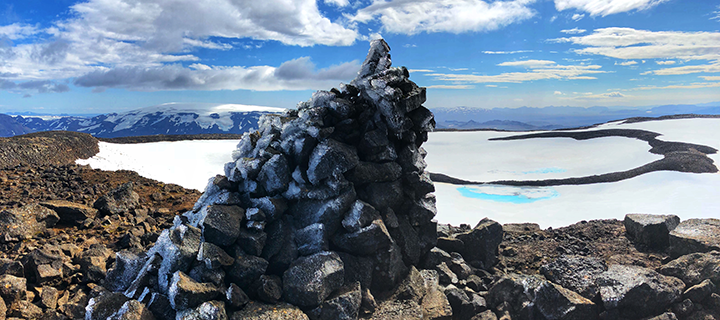
Image description: An ice-crusted cairn of dark rock stands in the foreground with an expanse of white glacier, ice-covered mountains, and cloudy sky stretching into the distance. Ragnar Antoniussen
Death of a Glacier
By Cymene Howe and Dominic Boyer
In 2014, the first of Iceland’s named glaciers suffered death by human-made climate change. Two anthropologists decided to mark its passing.
The Social Lives of Climate Reports
By Pamela D. McElwee
IPCC reports are hailed as objective, empirical evidence. But the social life of their production and circulation has much to do with conflicting politics, values, and choices.
My Petrochemical Love
By Frances Roberts-Gregory
For women of color on Louisiana’s Gulf Coast, everyday environmental and climate activism is entangled with intimate lives.
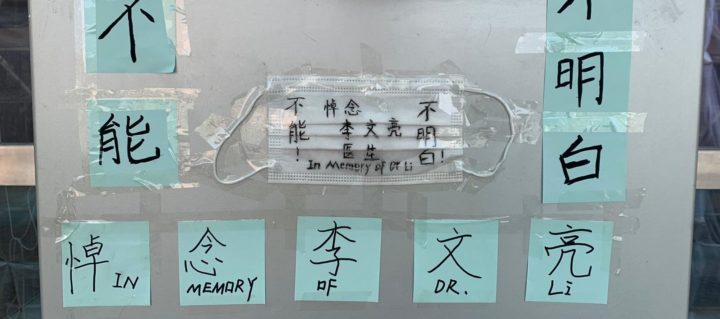
Image description: A photograph of post-it notes and a face mask taped to a wall with Chinese and English text written on them. The English text is “In memory of Dr. Li.” Ria Sinha
Going Viral in Hong Kong
Society for Medical Anthropology
By Justin Haruyama, Laura Meek, and Ria Sinha
Disease is but the most obvious part of an epidemic. As coronavirus spreads, it fuels many other kinds of contagious forces.
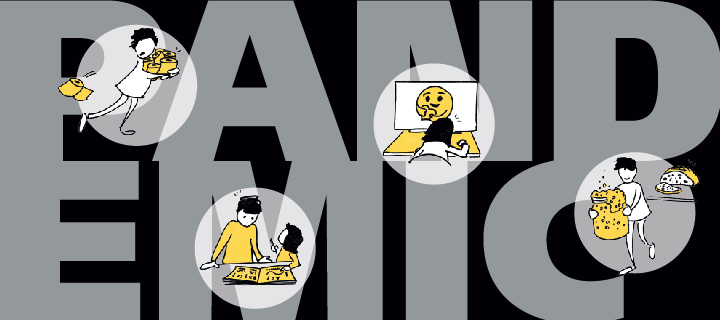
Image description: Grey text reads “PANDEMIC” on a black background. Layered on top are illustrations of individuals performing common activities during lockdown: one person carries an armful of toilet paper, a pair of people have a book open, one person sits in front of a computer screen displaying an emoji with a heart, and another person bakes bread. Charlotte Hollands
On Living through Plagues and Wars in Lebanon
By Munira Khayyat
In much of the Global North COVID-19 is wreaking existential havoc. For the war-seasoned Lebanese in the throes of an economic meltdown and ongoing protests, it is yet another in a long line of disasters to navigate and resist.
Social Inequality in Times of Pandemics
By Sharon N. DeWitte
We should not expect COVID-19 to behave in the same way as historical pandemics of plague. But both show how inequalities exacerbate mortality outcomes.
Ten Film Scenes Every Stay-At-Home Cinephile Should Know
By Ted Gideonse
Films, even ones about things that actually happened, are shadows, triggers, and symbols of our emotions—our fears, desires, needs, and nightmares. I’ve collected 10 scenes from the pandemic genre that get at some of those feelings quite accurately, even if they’re not exactly correct.
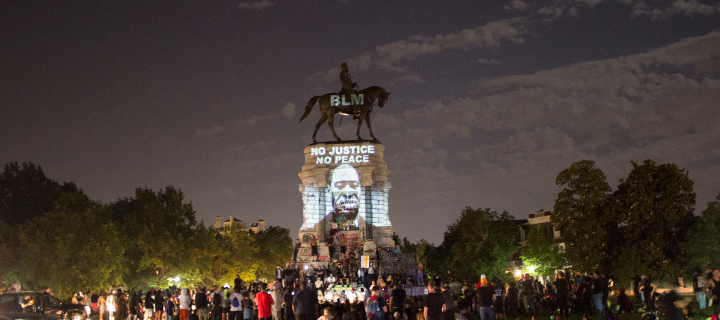
Image description: A crowd of people surround the monument to Robert E. Lee—a bronze statue of a man on a horse on top of a towering stone plinth—re-inscribed by lighting artist Dustin Klein with a haunting image of George Floyd beneath the words “No Justice No Peace”, and the social movement’s declaration, “BLM.” Dustin Klein
Monuments to Hate
By T. S. Harvey
We do not sit outside of the world in which we live. The current fight over the fate of Confederate monuments in US life is a direct struggle that calls for direct action by us all against racism.
Dear White Anthropologists, Let Not Symbolism Overshadow Substance
By Kimberley D. McKinson
Racism permeates the academy. We will need more than performative allyship and symbolic statements condemning racism in society if we are to build a more inclusive anthropology.
How Do We Listen to the Living?
Association of Black Anthropologists
By Brendane Tynes
These days, images of Black women protesting proliferate, but often they are accompanied with captions that describe Black women as on the frontlines fighting for the rights of Black men, as if police violence does not also affect us.

Image description: Circular blue objects with small black dots on them cluster together among black and white surroundings. CDC Public Health Image Library
Evolutionary Anthropology in the Time of COVID-19
Evolutionary Anthropology Society
By Mallika Sarma and Agustín Fuentes
Mallika Sarma and Agustín Fuentes discuss the perspective evolutionary anthropology brings to the COVID-19 pandemic and the critical role anthropologists have to play in this global crisis.
Black Latinx Activists on Anti-Blackness
The Association of Latina/o & Latinx Anthropologists
By Julie Torres
What do Black Latinx experiences add to the conversation of “Black Lives Matter” or, as we say in Spanish, “Las Vidas Negras Importan?”
Sounds Fishy?
Association for Political and Legal Anthropology
By Livia Garofalo, Elisa Lanari, and Martina Cavicchioli
Italy’s “Sardine” movement has been one of the most visible examples of grassroots anti-populist mobilizations in Europe. But how did the fish become an unlikely symbol of collective resistance to right-wing populism?
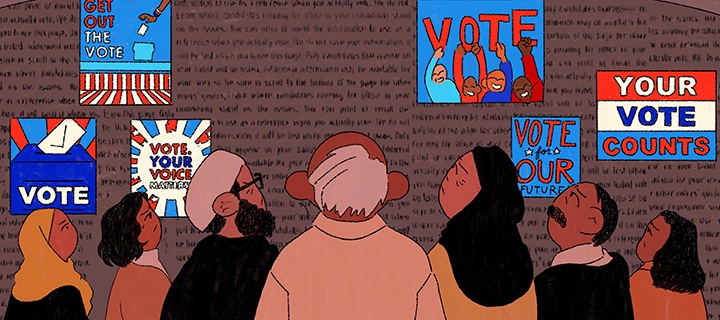
Image description: A wall of text is preceded by a heading that reads “Voting Information.” The wall is also covered with various posters that encourage voting with slogans such as “Your vote counts” and “Get out the vote.” A group of seven people look up at the signs. Sarula Bao (GOTV poster reproduced from an original by Chirag Shah for Indo-American Center, Chicago, 2018.)
Getting Out the Vote in South Asian Chicago
By Anar Parikh
Language access provisions to expand language minority voters’ access to the polls are not only about political participation. They also reveal the reproduction of white public space and white supremacy in US electoral practices.
Ten Things about Black Women Suffragists through a Black Feminist Lens
By Irma McClaurin
Irma McClaurin is a Black feminist anthropologist and consultant who conducts research on the social construction of inequality and its impact on African diaspora communities through an intersectional lens.
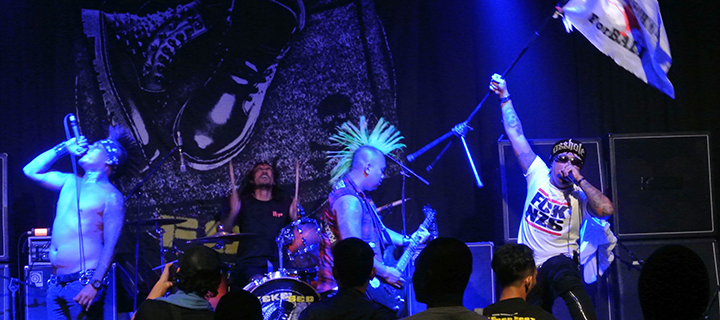
Image description: Three persons are on stage under blue lighting. Two are grabbing microphones and singing while the third with spiked hair is playing a guitar. One of the singers is holding a microphone stand with a white flag and writing that is not clear. In the background there is a fourth person playing a drum and in the foreground there are the backs of people attending the performance. Steve Moog
The Everyday Resistance of Anarchist Punks in Bandung, Indonesia
Society for Urban, National, and Transnational/Global Anthropology
By Steve Moog
The Bandung anarcho-punk scene is about do-it-yourself ethics and local acts of resistance. It is also plugged into and part of complex global DIY punk networks.
Cuban Food Security in a Time of COVID-19
By Hope Bastian and Hanna Garth
The pandemic has created new opportunities and barriers to food access in Cuba’s two largest cities.
Mercury’s Toxic Touch
Society for Medical Anthropology
By Ruth Goldstein
Indigenous leaders—facing toxic mining and environmental racism in the Peruvian Amazon—took their fight to Geneva, where they participated in the first global environmental agreement negotiated in the twenty-first century.
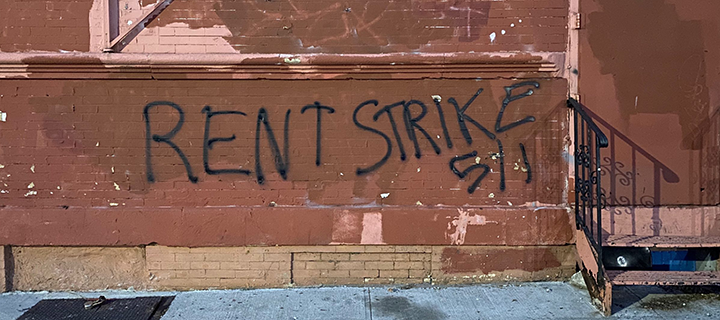
Image description: Graffiti, “RENT STRIKE 5/1” is written in black, on the side of a brown and pink building. Stephen F. Sullivan
Sound Politics in COVID-19 Brooklyn
Society for the Anthropology of North America
By Stephen F. Sullivan
Last spring, New Yorkers participated in the 7:00 p.m. clap to show solidarity with “essential workers” and assuage feelings of isolation. They used noisy cacerolazos to mobilize collective anger and demand housing and labor security.
A Revision of Outdated Course Policies Is Long Overdue
Council on Anthropology and Education
By Cathy Amanti
We need to humanize our course policies and practices and eliminate those that marginalize some students while privileging others.
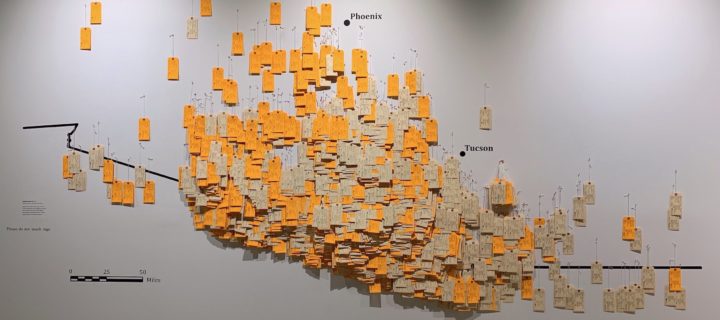
Image description: Orange and manila toe tags mounted onto a white wall with small red map pins. Toe tags represent individuals who have died in the Sonoran Desert of Arizona. Black cut out vinyl is adhered to the wall to outline the border between Arizona and Mexico. The Undocumented Migration Project
The Human Cost of Border Enforcement Policies
By Nicole Smith, Gabriel Canter, Austin Shipman, and Jason De León
A participatory pop-up exhibition breaks down traditional disciplinary boundaries between art and anthropology to inform wider audiences about the humanitarian crisis occurring at the United States–Mexico border.
All Things Ape
By Carol Underwood
One illustrator’s approach to conveying the multidimensional lives of apes with particular focus on their anatomy.
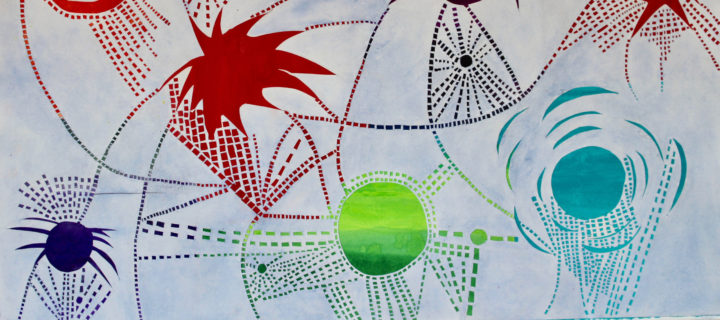
Image description. A large colorful painting and cutouts in red, green, blue, navy, and black. Colorful orbs and jagged, spiky shapes are connected by rows and grids of small blocks, some straight, some curving across the work. Lydia Nakashima Degarrod
The Anthropologist as Artist
By Lydia Nakashima Degarrod
A deeply interdisciplinary visual artist creates objects that are both art and ethnography. Her installations produce space for immersive, social forms of understanding.
Beer Can Photography
By Flora Mary Bartlett
In an age of digital technology, an experiment with pinhole cameras reveals a striking record of the sun’s daily path and a changing landscape in northern Sweden.
Cite as: “2020 Highlights.” Anthropology News website, December 21, 2020. DOI: 10.1111/AN.1557


